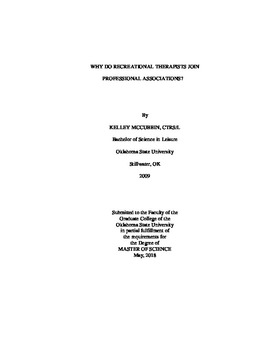| dc.contributor.advisor | Passmore, Tim | |
| dc.contributor.author | McCubbin, Kelley | |
| dc.date.accessioned | 2019-03-25T21:41:13Z | |
| dc.date.available | 2019-03-25T21:41:13Z | |
| dc.date.issued | 2018-05-01 | |
| dc.identifier.uri | https://hdl.handle.net/11244/317747 | |
| dc.description.abstract | Professional associations are the driving force for their profession. These associations are the most successful forces for eliciting change within and for the profession. Recreational Therapy professional associations are experiencing a trend in declining memberships, however little is known about why professionals choose to join, stay, or leave their professional association. Recreational Therapy is facing a period of growing needs to effectively promote the profession. With low membership, the Recreational Therapy professional associations lack to social capital necessary to meet the needs of the association and profession. This study utilized a non-experimental correlational study design to survey Recreational Therapists level of satisfaction and commitment to their professional association. This results of this study determined aspects of professional associations that Recreational Therapists were most satisfied and least satisfied with. Participants of this study included both Recreational Therapists who were members and Recreational Therapists who were nonmembers of their professional association. Additionally, this study found that professional association commitment and professional association satisfaction of Recreational Therapists could predict membership status. This study provides a greater understanding of areas of improvement within Recreational Therapy professional associations to retain and recruit members. Additionally, this study provides a greater understanding of the complexity that is the cost-benefit relationship between members and their professionals as well as a look into how professional identity influences professionals to join or not join their professional associations. | |
| dc.format | application/pdf | |
| dc.language | en_US | |
| dc.rights | Copyright is held by the author who has granted the Oklahoma State University Library the non-exclusive right to share this material in its institutional repository. Contact Digital Library Services at lib-dls@okstate.edu or 405-744-9161 for the permission policy on the use, reproduction or distribution of this material. | |
| dc.title | Why Do Recreational Therapists Join Professional Associations? | |
| dc.contributor.committeeMember | Zahl, Melissa | |
| dc.contributor.committeeMember | Lindenmeier, Donna | |
| osu.filename | McCubbin_okstate_0664M_15643.pdf | |
| osu.accesstype | Open Access | |
| dc.description.department | Leisure Studies | |
| dc.type.genre | Thesis | |
| dc.type.material | text | |
